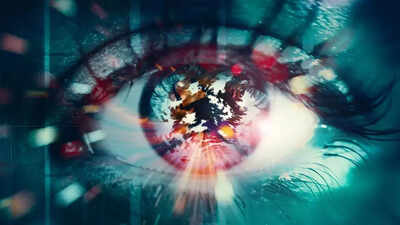Have you ever stopped to truly consider the nature of the present moment? A fascinating study from 2022, published in Science Advances, indicates that our perception of the "now" might be an illusion. The research suggests that your brain presents a visual representation of the world that is, in fact, up to 15 seconds old. This intriguing finding, highlighted by Popular Mechanics and UNILAD Tech, reveals the brain's tendency to blend past visual inputs to create a seemingly stable and seamless experience. In essence, we may be perpetually viewing a carefully edited version of the past, crafted by our brains to feel like the present. Let's delve into how this process works and the reasons behind it.

The human brain doesn't process visual information in real-time. Instead, it employs a clever tactic: delaying and merging images from the recent past to construct a stable and coherent picture of our surroundings. Scientists have termed this phenomenon a "previously unknown visual illusion". It serves as a protective mechanism, shielding us from the potential chaos of moment-to-moment perception.
This delay isn't a flaw; it's a survival advantage. Consider the dynamic nature of our environment – blinking lights, moving shadows, shifting objects, and our own eye movements. Attempting to process each and every change instantaneously would overwhelm our cognitive capacity.
To prevent sensory overload, our brains employ a process known as serial dependence. This involves blending our current visual input with what we perceived just moments ago. The result is visual smoothing, which gives us the impression of a calm and consistent scene. In other words, our brains prioritize tranquility over absolute precision.
The groundbreaking study revealed that our brains rely on visual snapshots from up to 15 seconds in the past. This implies that what we experience as the present moment is actually an edited replay of earlier visual information.
This delay is instrumental in helping us navigate a constantly changing world, as it prevents cognitive overload. Think of it as a biological buffer – our brains are continuously editing a video, replaying the last few seconds to ensure a seamless experience. Far from being a defect, this is an evolutionary adaptation. By prioritizing consistency over hyper-accurate real-time feedback, the brain enables us to:
In our fast-paced world, this smoothing effect is crucial in preventing our attention from being hijacked by every minor alteration in our surroundings.
This discovery challenges a core concept in mindfulness and philosophy – the idea of being fully present. If our visual reality is rooted in the past, then the "now" we believe we are experiencing is not truly present. It is a curated experience shaped by our brain's memory and educated guesses.
This raises profound questions:
In conclusion, you are, in a sense, seeing the past, and your brain is working hard to keep you unaware of this temporal discrepancy.
Newer articles
 Gujarat Cricket Association Set to Debut T20 League in 2025-26 Season
Gujarat Cricket Association Set to Debut T20 League in 2025-26 Season
 Nitish Rana Eyes Delhi Comeback After Disappointing Uttar Pradesh Stint
Nitish Rana Eyes Delhi Comeback After Disappointing Uttar Pradesh Stint
 India vs. England: Ex-Selector Slams Fielding Blunders After First Test Defeat; Costly Drops Haunt Team India
India vs. England: Ex-Selector Slams Fielding Blunders After First Test Defeat; Costly Drops Haunt Team India
 Indian Pacer Harshit Rana Released from Squad Ahead of Second England Test Amid Series Setback
Indian Pacer Harshit Rana Released from Squad Ahead of Second England Test Amid Series Setback
 Prithvi Shaw Admits to Misguided Choices and Lost Focus Amid Career Setbacks
Prithvi Shaw Admits to Misguided Choices and Lost Focus Amid Career Setbacks
 Sachin Tendulkar: 1983 World Cup Victory Fueled My Cricket Dream at Age 10
Sachin Tendulkar: 1983 World Cup Victory Fueled My Cricket Dream at Age 10
 Jannat Zubair Reveals Her "Biggest Regret" After Being Eliminated from "The Traitors"
Jannat Zubair Reveals Her "Biggest Regret" After Being Eliminated from "The Traitors"
 Rishabh Pant's Fearless Batting Style Hailed by Greg Chappell, Compares Him to Gilchrist After Twin Centuries vs. England
Rishabh Pant's Fearless Batting Style Hailed by Greg Chappell, Compares Him to Gilchrist After Twin Centuries vs. England
 Pant Climbs to Career-Best Ranking, Bumrah Retains Top Spot in Latest ICC Test Update
Pant Climbs to Career-Best Ranking, Bumrah Retains Top Spot in Latest ICC Test Update
 Headline:
Bangladesh's Shadman Islam Stands by Teammates After Batting Woes on Day 1 vs. Sri Lanka
Headline:
Bangladesh's Shadman Islam Stands by Teammates After Batting Woes on Day 1 vs. Sri Lanka